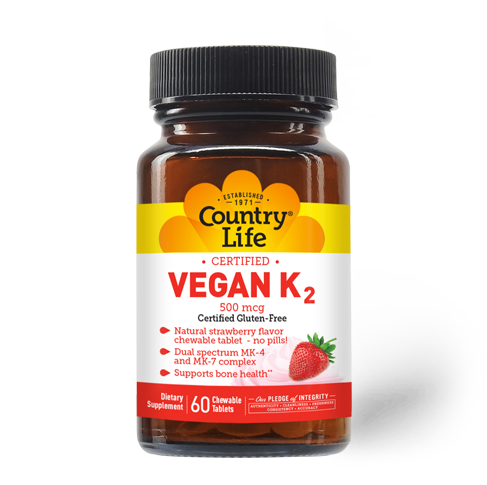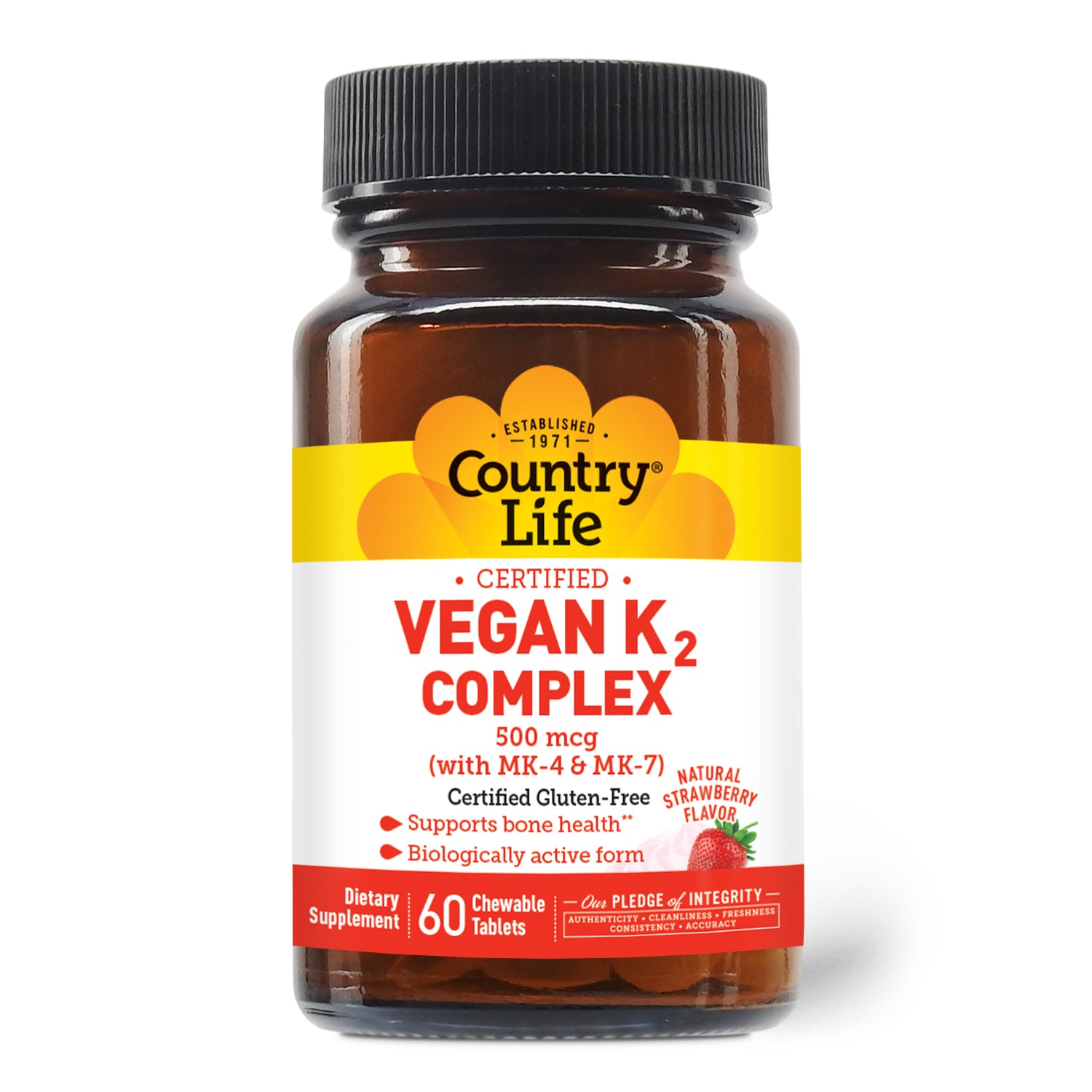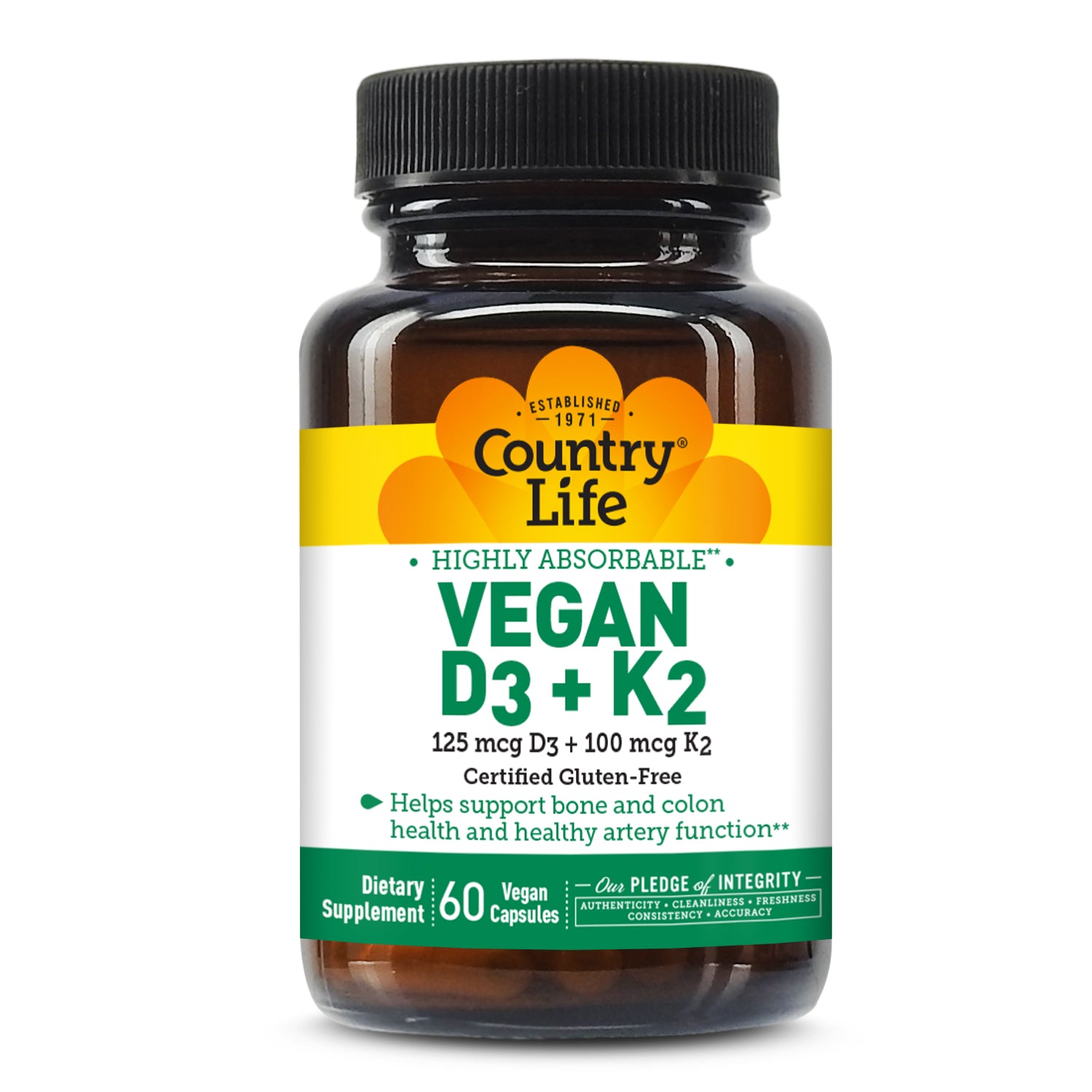A lot of people are talking about vitamin K2, especially in relation to vitamin D3 in supplements.
But what is vitamin K2? How is it different from regular vitamin K? And do you need to add vitamin K2 to your vitamin D or general supplement routine?
We’re answering all these vitamin K2 questions plus explaining its benefits, side effects, and how to choose a quality vitamin K2 supplement.
What is Vitamin K2?
Think all vitamin K is the same? Well, that’s what most everyone thought until recently.
Now, the term “vitamin K” may encompass vitamin K1, also known as phylloquinone, and vitamin K2, also known as menaquinone.
Although the two are similar in structure and function, there are significant differences in their absorption rates, how long they stay in the bloodstream, and their dietary sources.
- Vitamin K1 is predominantly found in plant foods such as leafy greens and is the most consumed form of vitamin K. It’s also poorly absorbed and remains in the blood for a short time.
- Vitamin K2, also known as menaquinone (MK), has ten subtypes, known as MK-4 to MK-13.
MK-4 is found in some animal foods. The other subtypes are produced by gut bacteria, and some can be found in fermented foods, such as soybeans.
Vitamin K2 is also believed to be better absorbed and retained in the bloodstream.
Both types of vitamin K are fat-soluble and play similar roles in promoting various aspects of health, such as blood clotting and calcium transport.
We’ll explore more about the benefits and actions of vitamin K2 in subsequent sections.
Food Sources of Vitamin K2
While vitamin K1 is predominantly found in leafy greens, vitamin K2 is found mainly in animal foods and some fermented foods, including:
- Meats like beef, pork, chicken breast, and chicken liver
- Dairy products
- Eggs
- Fermented foods like natto (a Japanese dish of fermented soybeans) and sauerkraut
As mentioned previously, the body also manufactures its own vitamin K2 in the gut.
6 Benefits of Vitamin K2
Although vitamin K is best known for its role in blood clotting, vitamin K2 has many vital actions in the body.
Here are six impressive benefits of vitamin K2.
1. Vitamin K2 Promotes Bone Mineralization
Vitamin K2 helps activate specific proteins, such as osteocalcin, which allows calcium to bind to bones.
As you may have heard, vitamin K2 has a synergistic relationship with vitamin D and calcium.
Specifically, vitamin D increases calcium absorption while vitamin K2 acts as a shuttle, ensuring calcium is deposited safely into the bones and teeth and away from the arteries.
Although more high-powered studies are needed, emerging research suggests a decreased risk of bone fracture from taking Vitamin K2 supplements.
Related reading: What Vitamins To Take Together: The Best Pairings For Optimal Absorption
2. Vitamin K2 is Essential for Blood Clotting
If you’ve had a baby, you probably know about the benefits of vitamin K2 for the prevention of vitamin K deficiency bleeding in newborns who cannot yet clot.
Vitamin K2 works by promoting the production of various proteins, including prothrombin, which is crucial for blood clotting.
In newborn babies and rare cases of vitamin K deficiency, a lack of blood clotting can cause uncontrollable bleeding and death in the case of injury.
3. Vitamin K2 Promotes Arterial and Cardiovascular Function
Vitamin K2 not only promotes blood clotting, but it's involved in various other aspects of cardiovascular function, including:
- Protecting arterial function
- Supporting endothelial function (the cellular lining of blood vessels)
- Promoting normal vascular function
- Supporting metabolic health
Vitamin K2 helps promote arterial function through its relationship with vitamin D.
Some research also suggests vitamin K2 supplementation may decrease the risk of cardiovascular events, but more research is needed.
Related reading: How Can I Have a Healthy Heart? 5 Ways to Strengthen Heart Health
4. Promotes Dental Health
Vitamin K2’s calcium transport and binding properties also benefit dental health by supporting calcium deposition into the dentin, creating healthier, stronger teeth.
5. May Support Cognitive Function
Newer research suggests that vitamin K2 may act on specific areas of the brain, helping to support various aspects of normal cognitive function.
Although further research is needed, vitamin K2’s beneficial effects on vascular health and arterial function may have downstream benefits for the brain.
6. Vitamin K2 May Promote Metabolic Function
Metabolism encompasses various organs and systems, including the cardiovascular system, digestion, the pancreas, and more.
Emerging research suggests vitamin K2 supplementation may promote several aspects of normal metabolic function, including:
- Cardiovascular function (as noted previously)
- Normal sugar metabolism
- Better abdominal body composition in post-menopausal women
Although more research is needed, these initial findings suggest vitamin K2 may provide multifaceted benefits for metabolic function.
Vitamin K2 Supplements & The Vitamin D3 K2 Connection
Vitamin K2 is most frequently discussed in relation to vitamin D supplementation, with some experts claiming that vitamin D supplementation is ineffective without vitamin K.
Others refute this theory based on conflicting research showing serum vitamin D levels increase without additional vitamin K2.
So, who’s right? Currently, research suggests that both camps have a point, so further studies are needed.
Here’s a bit more context on the vitamin D vitamin K debate, so you can make an informed choice.
As discussed previously, research has shown that vitamin D and vitamin K2 work together to enhance calcium absorption and ensure it’s deposited into the bones versus the arteries.
This is why many doctors, practitioners, and scientists recommend combining vitamin D with K2 in supplements.
However, other experts argue that there is insufficient evidence to support the theory that combining vitamin D & K supplementation is effective, and therefore recommend sticking with vitamin D3 as a standalone supplement.
Ultimately, there is evidence to support both sides of the debate, so the decision is up to you and your healthcare practitioner.
RDA of Vitamin K2
There is no recommended daily allowance for vitamin K2, and deficiency is rare. However, the adequate intake level is 120 micrograms per day for males and 90 micrograms per day for females.
Your healthcare practitioner may recommend more or less depending on various factors such as your health history, diet, vitamin D supplementation, and others.
Vitamin K2 Side Effects & Contraindications: Can You Take Too Much?
Vitamin K2 is considered very safe, with no adverse events reported from taking too much, according to the Institute of Medicine.
However, vitamin K (K1 or K2) can interact with certain medications, especially anticoagulants like warfarin, creating a potentially deadly combination.
As discussed previously, certain medications can compromise your body’s ability to make and absorb vitamin K2, including antibiotics, Bile acid sequestrants, and the weight-loss drug orlistat.
Who Should Take Vitamin K2?
Since deficiency is rare, most people don’t need to take a vitamin K2 supplement.
However, as previously discussed, many doctors and healthcare practitioners recommend taking it with vitamin D3.
Your healthcare practitioner may also recommend taking vitamin K2 if you are at risk of bone health issues, are a vegan or vegetarian, are taking certain medications that interfere with the body’s ability to absorb or make vitamin K2, or have a vitamin K2 deficiency.
Ask your healthcare practitioner for individual recommendations.
How to Choose a High-Quality Vitamin K2 Supplement
Although vitamin K2 deficiency is rare, some people choose to or need to supplement for certain health concerns or if they’re taking medications that interfere with vitamin K2 production or absorption.
Country Life Vitamins offers vitamin K2 in a stand-alone supplement and in a vegan vitamin D3 K2 chewable:
- Vegan K2 Complex: A dual-spectrum Vitamin K2 complex (as Menaquinone - MK-4 and MK-7) in a delicious, chewable tablet
- Vitamin D3 + K2: A unique and highly absorbable blend combines vegan D3 with K2 in both MK-4 and MK-7 forms—making it the only certified vegan and gluten-free option of its kind
All Country Life supplements are made in our cGMP-compliant, Certified Gluten-Free, Certified Organic manufacturing facilities using the highest-quality, evidence-based ingredients.
Sources Mentioned in this Article:
- “Vitamin K Fact Sheet for Health Professionals”. National Institutes of Health Office of Dietary Supplements.
- “The role of menaquinones (vitamin K₂) in human health”. Br J Nutr.
- “The Role of Vitamin K2 in Cardiovascular Health. Review Article.” Interventional Cardiology (2024).
- “The Synergistic Interplay between Vitamins D and K for Bone and Cardiovascular Health: A Narrative Review”. Int J Endocrinol.
- “Dietary intake of menaquinone is associated with a reduced risk of coronary heart disease: the Rotterdam Study”. J Nutr.
- “Vitamin K and the prevention of fractures: systematic review and meta-analysis of randomized controlled trials”. Arch Intern Med.
- “Menaquinones, bacteria, and the food supply: the relevance of dairy and fermented food products to vitamin K requirements”. Adv Nutr.
- “The Potential Systemic Role of Diet in Dental Caries Development and Arrest: A Narrative Review”. Nutrients.
- “The role of vitamin K2 in cognitive impairment: linking vascular health to brain health”. Front Aging Neurosci.
- “Vitamin K2 supplementation improves insulin sensitivity via osteocalcin metabolism: a placebo-controlled trial”. Diabetes Care.
- “Vitamin K-induced effects on body fat and weight: results from a 3-year vitamin K2 intervention study”. Eur J Clin Nutr.















Share:
Try Our New Hydrating Gummy: MAXI-HAIR® Skin & Nails with Hyaluronic Acid + Biotin
The Essential Supplements & Vitamins for Women in Their 30s, 40s, and 50s